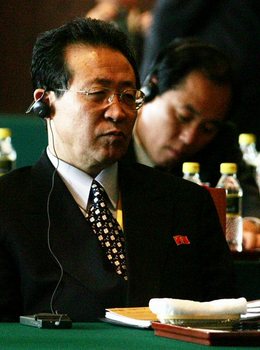 |
|
North Korea's vice foreign minister Kim Gye-gwan participated in the 5th round of six-party talks in Beijing, September 9, 2005
|
Washington seems to be softening its N.K. stance
International society has adopted two basic options regarding North Korea’s missile tests. One is putting pressure on the regime and the other is diplomacy through the six-party talks involving South and North Korea, the U.S., Japan, China, and Russia.
On the first side of the spectrum, the U.S. and Japan requested an emergency meeting of the UN Security Council following the test launches, and Japan is expected to exercise tough sanctions against North Korea. As China and Russia have resisted U.S.-led efforts to introduce a UN Security Council resolution, there will likely be various disagreements to come.
Then, leaning toward the other side of the spectrum, Presidents Roh Moo-hyun and George Bush spoke on the phone July 6 on ways to work through the issue, agreeing to solve the problem through diplomacy, said Jeong Tae-ho, a spokesperson for the presidential office.
President Bush, at a press conference on July 5, said that the test firings would serve to further isolate the communist nation, and called the move regrettable for the North Korean people, as well. But, he said, the best option is to solve the matter through diplomacy. The U.S. president using the words "North Korean leader" in his speech, an unprecedented move.
During the telephone conversation with his South Korean counterpart, President Bush emphasized the necessity of diplomatic efforts to solve the problem through dialogue. He mentioned Secretary of State Condoleezza Rice’s visit to Seoul scheduled for the end of July and a summit with his South Korean counterpart due to happen in September. The U.S. president also suggested that President Roh hold close discussions with other partners of the six-nation talks.
In addition to these moves, Assistant Secretary of State Christopher Hill left Washington to visit four other parties of the North Korean nuclear talks, China, South Korea, Japan and Russia, and will hold consultations on how to solve the missile issue and resume the stalled six-nation talks. Hill will likely discuss ways to persuade North Korea back to the negotiating table ahead of Chinese Vice Foreign Minister Wu Dawei’s visit to Pyongyang on July 10.
In an interview with CNN on July 5, Secretary Hill stressed the importance of solving the missile problem within the framework of the six-party talks, saying that it is North Korea that has less interest in the talks, not the U.S.
After meeting Secretary of State Rice and National Security Adviser Steven Hadley, South Korea’s national security secretary Song Min-soon said, "Using the framework of the denuclearization talks, we can overcome the differences between the two sides. This means solving the crisis politically, regardless of time and place."
Minister Wu said at a July 6 meeting in Beijing with Ichiro Ozawa, leader of the Democratic Party of Japan, "It is reasonable to hold a [bilateral] meeting between North Korea and the U.S. while also using [the format of] the six-party talks."
In the meantime, Tokyo is reportedly considering further economic blockades agains the North, besides the existing nine-item sanctions imposed on Pyongyang that include the barring of certain North Korean commercial ships from docking in Japan.






